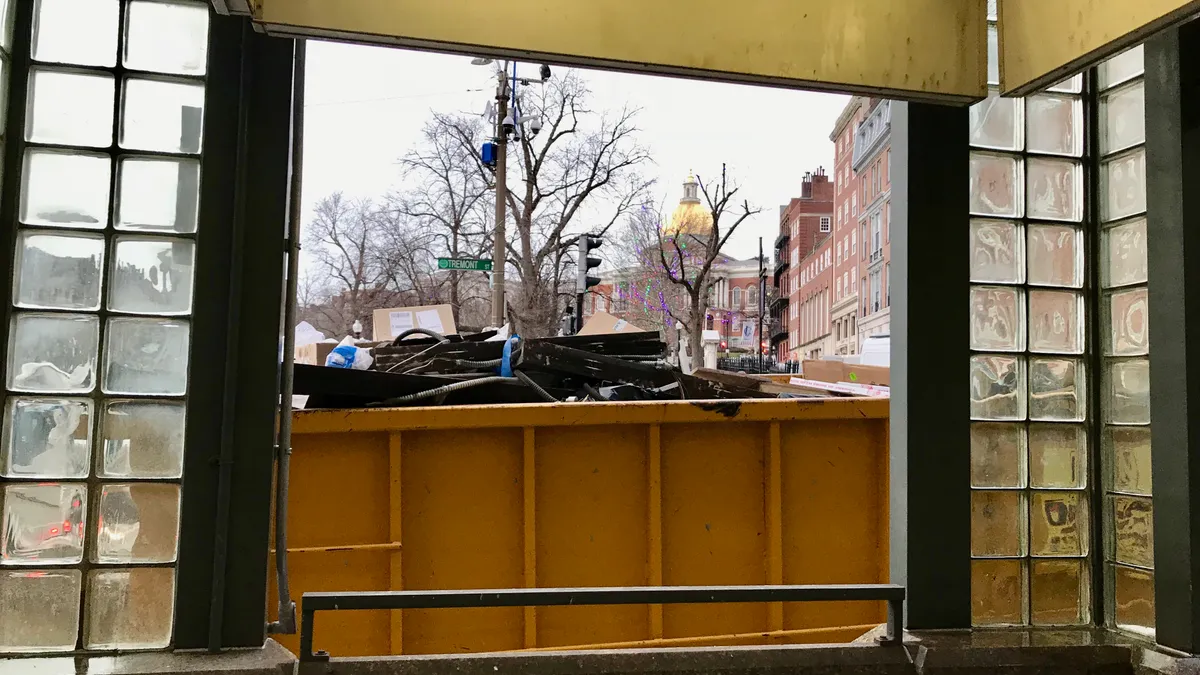As a teenager, Ginger Spencer was never one to turn down a challenge.
"When I was a preteen, I remember someone challenged me to race against this teenage boy because they knew I was fast, but they wanted to see how fast I was," the newly-appointed Phoenix Public Works Director told Waste Dive. "So I did."
Spencer, who transitioned from a high school track star to a professional in social services following the completion of her master's degree in Public Policy and Management, always had a mission to "conquer the world." In 1998, her path led her to the Phoenix city government where she worked her way up to become the first female director of the Public Works Department in April this year.
Waste Dive spoke with Spencer to learn more about her managerial expertise, her work with Reimagine Phoenix and her advice for women who are hoping to take a seat at the executive table.
This interview has been edited for clarity and brevity.
WASTE DIVE: Can you give me some background on your journey into waste and recycling?
GINGER SPENCER: When I came into the city, a lot of individuals who were already leaders and executives in the organization encouraged me to pursue a career in a nontraditional role. I thought ‘Oh, I'll go to work in our Human Services Department,' but everyone was like ‘No, Ginger that's where … a lot of women go. You should think about other departments like the Aviation Department or Department of Public Works.’ The thing that excited me the most about public works — I thought it was just so sexy — is that every city has a public works department in some form or fashion. And in Phoenix, I describe our public works department as like an octopus where our tentacles are touching every single department.
"I said if I ever had the chance to work in the solid waste area, that's what I wanted to do because that's where all the innovation was taking place."

Ginger Spencer
Director, Phoenix Public Works Department
We have over 20 city departments —14,000 employees — and [public works] gets to work with every single department. I came in to the department halfway through my career as a deputy director over at the Administrative Services Department. So I'm a nerd — I like numbers — and I was over at the procurement area, the budget area, IT as well as our environmental area and H.R. So as I was the deputy director over that division for six years it really let me work with all of my sister divisions in the department, and I said if I ever had the chance to work in the solid waste area, that's what I wanted to do, because that's where all the innovation was taking place. It was an exciting place to be. So a couple of years ago I had the chance to basically be promoted to assistant director over the solid waste area and it's been great ever since.
How has your role changed since you were promoted to director in April?
SPENCER: I have a few more zeroes when it comes to staffing and budget and all of that. I've spent half my career in the public works department, so public works is home for me ... I've been an executive probably for five years. I've been in middle management for about 15 years. So thankfully I was already used to working at a very fast pace. I think that, had I not had those other opportunities, I think what would have what would have shocked me the most was the pace.
In the time you’ve been at the department, what’s the biggest transition that you’ve seen?
SPENCER: I've had the opportunity to work with at least four public works directors before me, and I think the thing that has changed the most over time is that we've always been innovative but we definitely are more business minded. I think in order to be resilient as a public works department, in order to continue to be leaders when it comes to solid waste management, we have to run ourselves as a business. Yes, we are government, but it's about the bottom line. It’s about being efficient. It's about valuing our employees and coming up with new and creative ideas to perform our business. It's not always about having more resources to do the job ... We've been able to do a lot of things in the last couple of years just using existing resources and finding savings within our budget so that we can do new programs without having to increase our rates to our customers.
I know Mayor Stanton mentioned a goal of making Phoenix the world’s most sustainable city. How is that progressing and what are the barriers?
SPENCER: We've achieved 30% diversion rate. Our goal is to get to 40% by 2020 and then we're going to zero waste by 2050. We have very ambitious goals, but I think the goals are attainable if you have the right team. So we have to continue to be visionaries. We have to continue to be diligent. Everything we do, we need to make sure that we're keeping in mind, ‘OK is this going to help us get to 40%, or is this a distraction, or is it going to have an adverse impact on what we do?’ I think with the right team, the right people, the right attitude, we can achieve the goal of becoming the world's most sustainable city.
But we can't do this alone. We have to work with businesses. Reimagine Phoenix is broken up into three initiatives, it's a public-private partnership. We're building a resource innovation campus where we want companies to come and set up shop on our campus and basically take our waste and transform it into a resource. We have to continue to offer new programs and services to our residents, so by offering a curbside green organics program, hopefully once we get to 40%, what I want to focus on is having a residential food waste program. And then thirdly is education. We have to make sure that we're doing continuous education with our residents … If we're not educating our residents on the proper way to recycle, then we can have all these new programs and services, but our contamination is going to continue to rise, or we're not focusing on just reducing the amount of waste that you consume in the first place. Then when the economy's good the amount of waste increases. So we have to continue the educational efforts.
On the topic of education, how have you been working to get younger generations involved and aware of these diversion efforts?
SPENCER: Actually our focus is on the younger generations. We're working very closely with schools in the area, we go to a lot of community events, we do tours of our MRFs ... Our focus is on the children. We're trying to get the next generation, because we know that if we teach a child how to recycle, they’re little sponges, they’re taking it all in, and then they're going to go home and tell their parents about it. We’ve partnered with our parks department, they have after school programs with children and so we're there as well.
What we're trying to do though right now is [figure out], how do we get to the millennials? How do we reach out to them as well? We're really trying to get that younger generation so that way when they're adults, when it's 2030, they already have this ingrained and we're not trying to reprogram what's recyclable and what's not. They already know it. I think that's the key for a lot of cities. We want to continue to do our education efforts in the general community with adults ... But the youth, again, they're little sponges and I think that's how we're going to change behavior in the long run.
What advice would you give to women who may be entering a position similar to yours who may be intimidated by workplace demographics?
SPENCER: We go to these meetings locally, nationally, internationally and you know [women] are the minority. Sometimes when I see other women, I want to do back flips. One of my favorite authors is Sheryl Sandberg with her book "Lean In," and that's really what we have to do. We have to lean in. You can't be afraid. So lead from your current position and be up to the task.
"We go to these meetings ... and you know [women] are the minority. Sometimes when I see other women, I want to do backflips."

Ginger Spencer
Director, Phoenix Public Works Department
I always have been a leader ... Even in high school when I was a track star, I remember going and getting other young women to come and join the team because for me, the team is so important ... But then I also needed to challenge myself, so I was training with the guys. So I think we just have to step up to the plate. You can't be fearful. You need to have mentors in this field. It's great if you can find a female mentor, but you're probably going to need some male mentors as well. Here in Phoenix, we started an apprenticeship program because women represent about 17% of our base in public works. So [now] we can encourage more women and minorities to enter into the field of public works. We're looking for leadership potential, we're going to train them and help them get their CDLs.
It's just having the confidence, going for it and pursuing your goals. I'm thankful that I listened to people when they said, 'Hey Ginger, pursue a career in a nontraditional role.' And then know that there are other women that are trying to pave the way for us to get to where we want to get ... We've just got to continue to groom the next generation of female leaders and make sure we're passing that baton.

















